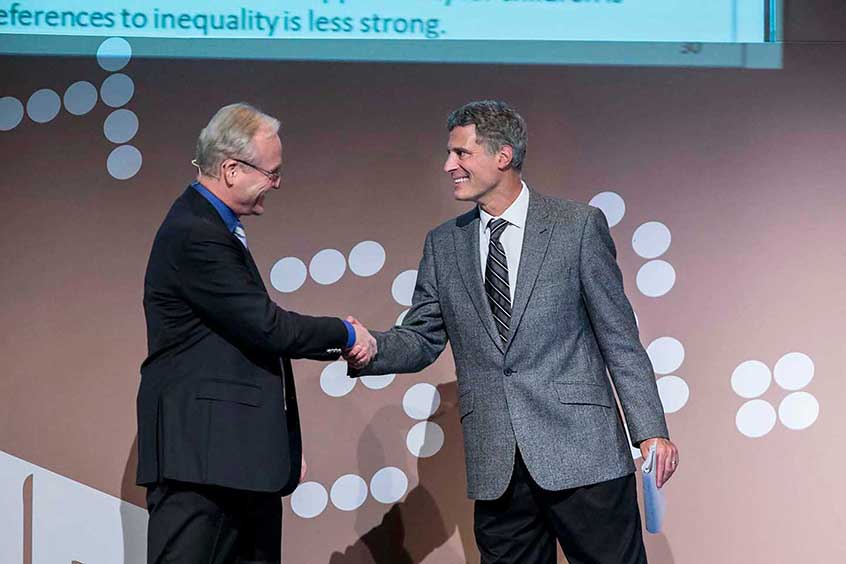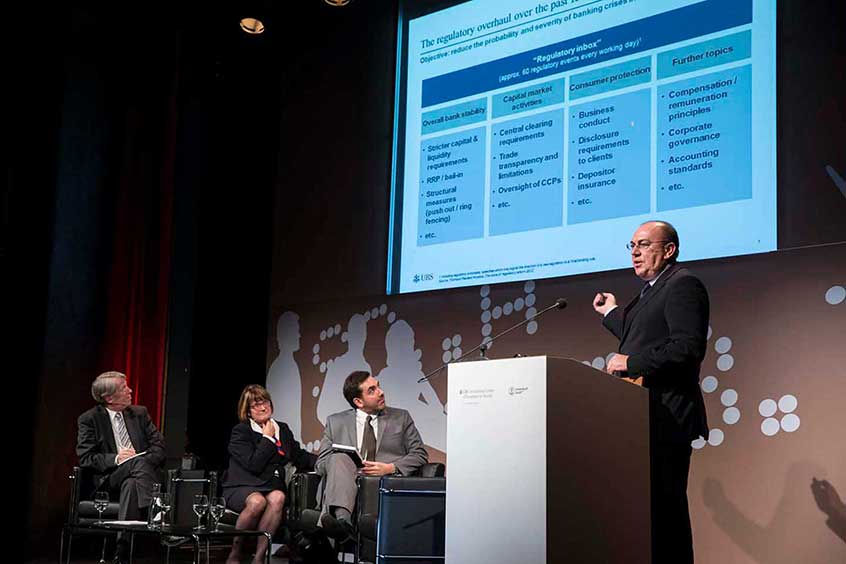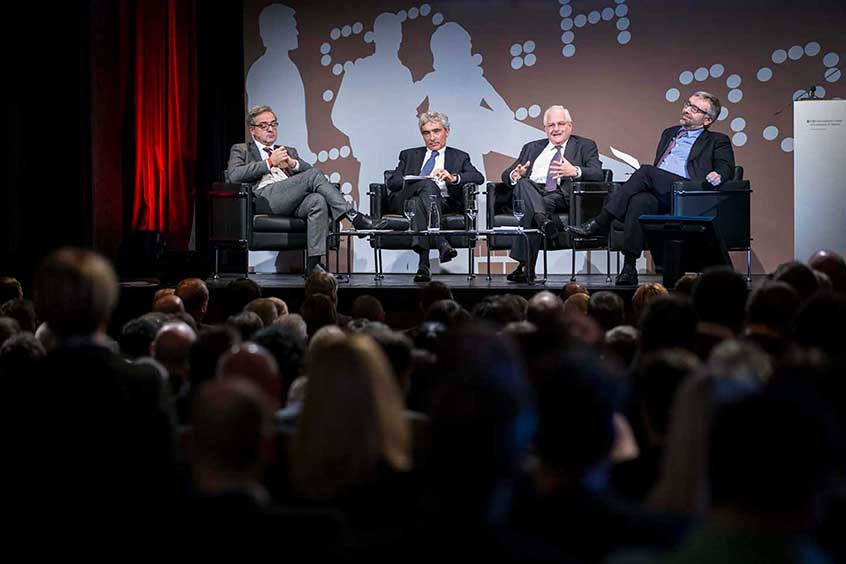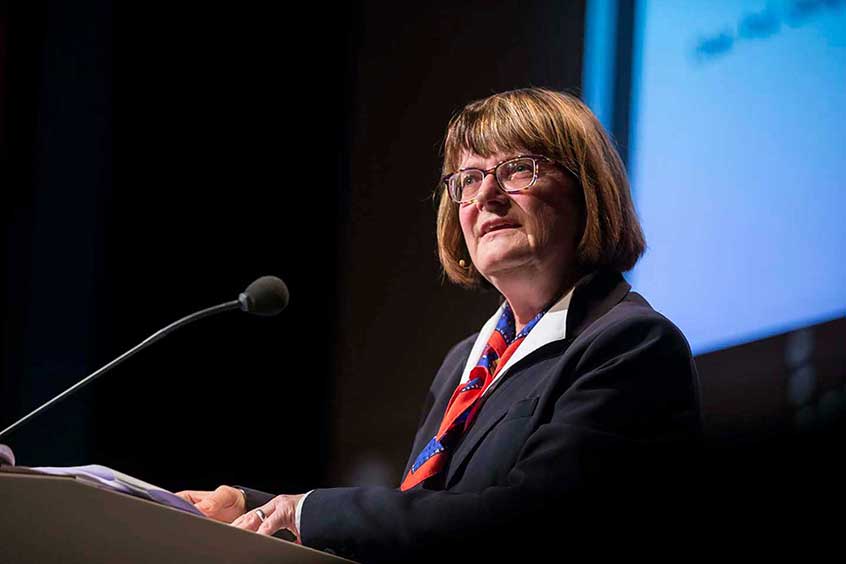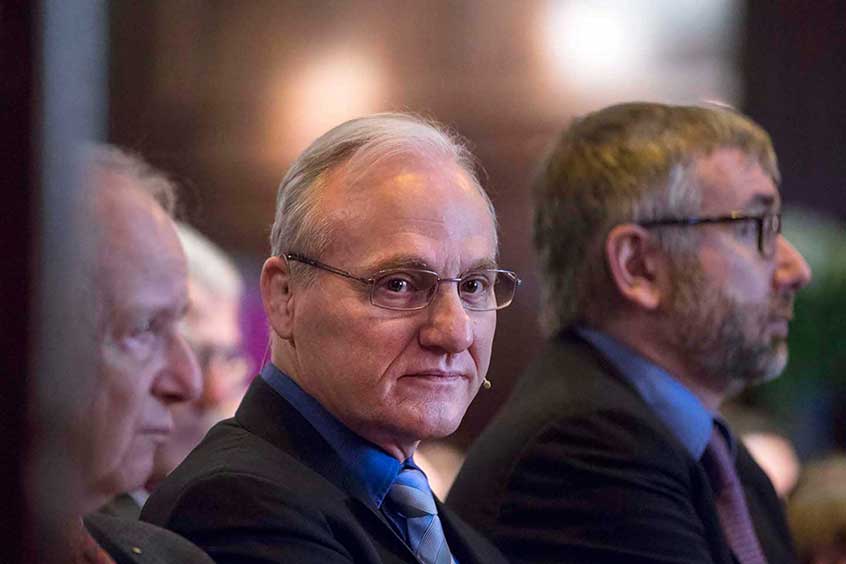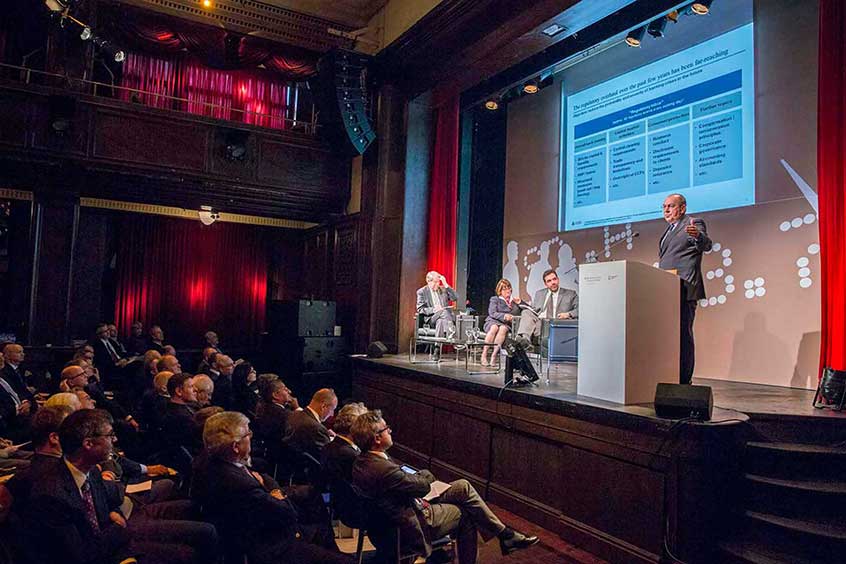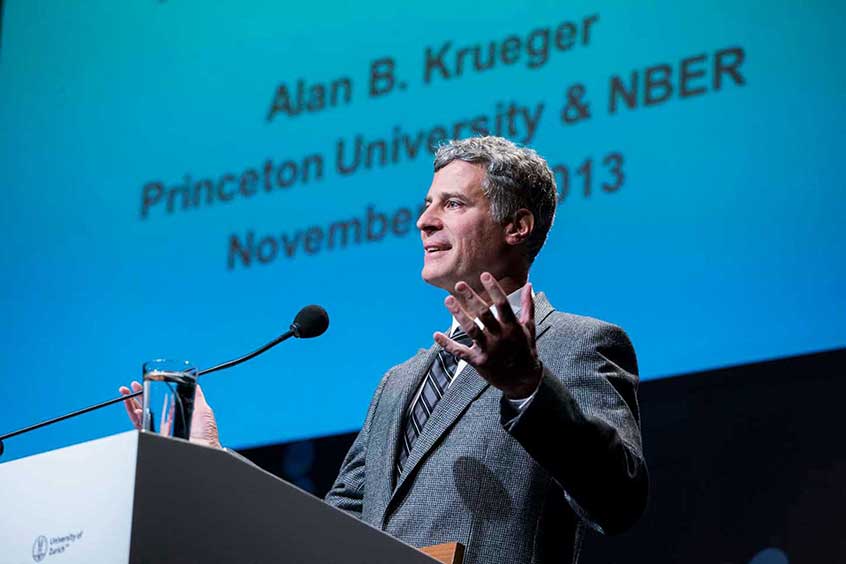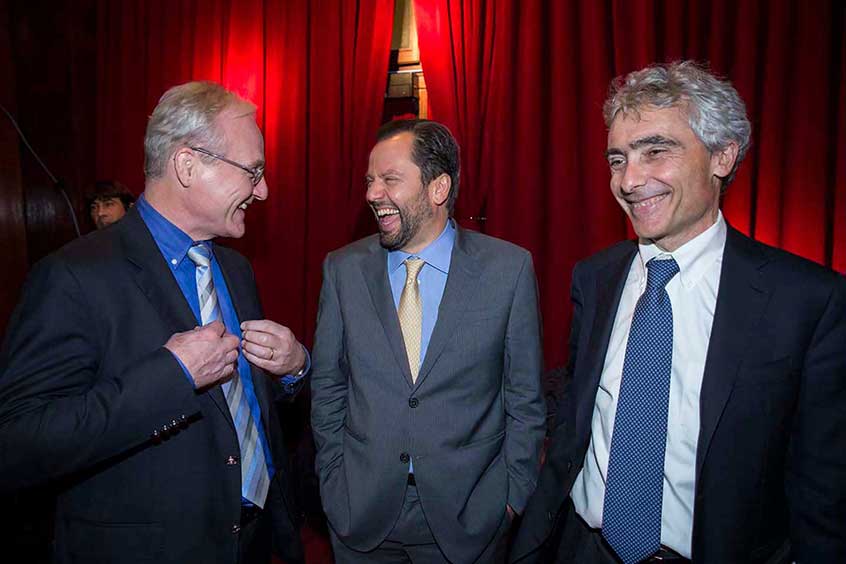Fair and Efficient Rules for Capitalism
Jump directly to
Fair and Efficient Rules for Capitalism
Jump directly to
Amidst the current financial and economic crisis, the debate about the future of "western capitalism" is of central importance. Most people accept that missing, inefficient, or misguided regulation was in large part the cause of the last financial crisis. So the questions that need to be answered are: What role should the state play? What constitutes fair and efficient regulations for the financial markets? Which unofficial rules, norms and individual or group behaviors are important for the smooth functioning of societies and economies?
The Forum for Economic Dialogue 2013 on "Fair and Efficient Rules for Capitalism" offered an ideal platform for academics, business people, public officials, and interested citizens to engage in an exchange of knowledge, latest insights and ideas.
The program contained three main sessions:
The event started with a keynote lecture by Alan Krueger (Princeton) and was concluded with the Zurich Lecture of Economics in Society on "A Capitalism for the People", delivered by Luigi Zingales (Chicago).
All panel sessions and speeches were recorded and are available for you on this page. Hear topnotch speakers such as: Alan Krueger (Princeton), Martin Wolf (FT), Axel Weber (UBS), Martin Hellwig (Max Planck Institute), Luigi Zingales (Chicago), Anne Héritier Lachat (FINMA), and many more.
Amidst the current financial and economic crisis, the debate about the future of "western capitalism" is of central importance. Most people accept that missing, inefficient, or misguided regulation was in large part the cause of the last financial crisis. So the questions that need to be answered are: What role should the state play? What constitutes fair and efficient regulations for the financial markets? Which unofficial rules, norms and individual or group behaviors are important for the smooth functioning of societies and economies?
The Forum for Economic Dialogue 2013 on "Fair and Efficient Rules for Capitalism" offered an ideal platform for academics, business people, public officials, and interested citizens to engage in an exchange of knowledge, latest insights and ideas.
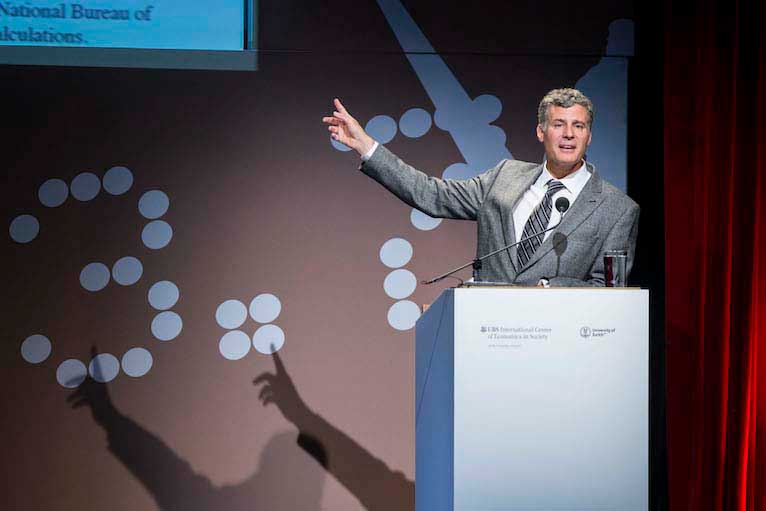
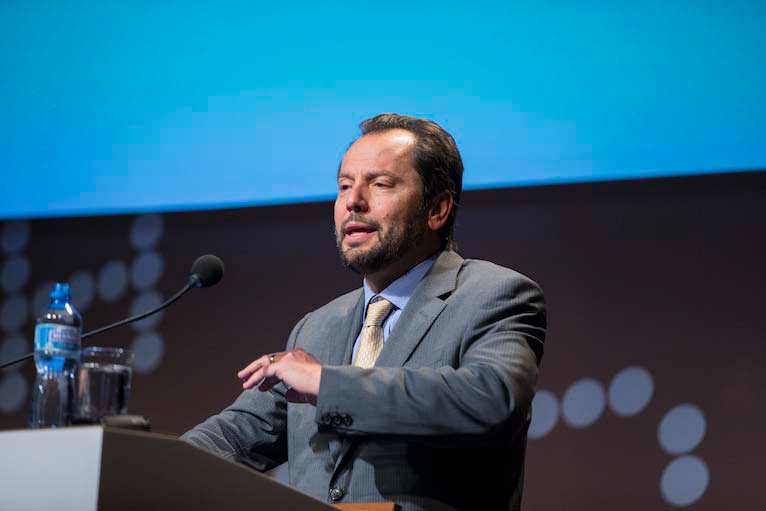
George-Marios Angeletos is Professor of Economics at the Massachusetts Institute of Technology (MIT). With effect of September 1, 2013, he is Chair of Macroeconomics and Financial Markets at the University of Zurich's Department of Economics and Affiliated Professor at the UBS Center.
Prof. Angeletos' research covers a wider range of topics within the field of macroeconomics, including heterogeneous information and expectations, global games, self-fulfilling crises, business cycles, and incomplete markets.
Tito Boeri is Professor of Economics and Dean for Research at Bocconi University, Milan, where he also acts as Scientific Director of the Fondazione Rodolfo Debenedetti. He is the founder of the economic policy watchdog website Lavoce.info, founding editor of Voxeu.org, and scientific director of the Festival of Economics in Trento. He was senior economist at the Organisation for Economic Co-operation and Development and has been consultant to the European Commission, European Central Bank, International Monetary Fund, ILO, World Bank and the Italian Government.
His research interests are labour economics, political economics, and transition economics.
Armin Falk is a Professor of Economics at the University of Bonn and Chief Executive Officer of briq. He is Fellow of the European Economic Association, Director of the Bonn Laboratory for Experimental Economics, Associate Editor of the Quarterly Journal of Economics, and affiliated with Hausdorff Center for Mathematics, Institute for New Economic Thinking, Institute of Labor Economics (IZA), German Institute for Economic Research (DIW), Centre for Economic Policy (CEPR), CESifo, and the Max Planck Institute for Research on Collective Goods. Falk’s research focuses on determinants and consequences of time, risk and social preferences, sources of inequality, early childhood development, and the malleability of moral behavior. He has received two ERC grants and was awarded the Gossen Prize in 2008, the Leibniz Prize in 2009, as well as the Yrjö Jahnsson Award in 2011.
Ernst Fehr received his doctorate from the University of Vienna in 1986. His work has shown how social motives shape the cooperation, negotiations and coordination among actors and how this affects the functioning of incentives, markets and organisations. His work identifies important conditions under which cooperation flourishes and breaks down. The work on the psychological foundations of incentives informs us about the merits and the limits of financial incentives for the compensation of employees. In other work he has shown the importance of corporate culture for the performance of firms. In more recent work he shows how social motives affect how people vote on issues related to the redistribution of incomes and how differences in people’s intrinsic patience is related to wealth inequality. His work has found large resonance inside and outside academia with more than 100’000 Google Scholar citations and his work has been mentioned many times in international and national newspapers.
Martin Hellwig was appointed Director, Max Planck Institute for Research on Collective Goods, Bonn, and Professor of Economics, University of Bonn (Courtesy Appointment) in 2004.
Prof. Hellwig is a member of the Scientific Advisory Committee of the European Systemic Risk Board and of the Economic Advisory Group on Competition Policy of the European Commission, DG Comp.
His research interests involve public economics, network industries and competition policy, financial markets and institutions, corporate governance, foundations of monetary theory and macroeconomics.
Anne Héritier Lachat has been Chairwoman of the FINMA Board of Directors since 2011, elected by the Federal Council. She has been a member of the FINMA Board of Directors since 2008, and prior to that was a member of the Swiss Federal Banking Commission (SFBC) from 2005.
She is a former judge, lawyer and since 2009 Associate Professor at the Faculty of Law at the University of Geneva.
"Since 1987 Professor Alan Krueger has held a joint appointment in the Economics Department and Woodrow Wilson School at Princeton University. He is the founding Director of the Princeton University Survey Research Center and author of \"Education Matters: A Selection of Essays on Education,\" co-author of \"Myth and Measurement: The New Economics of the Minimum Wage,\" and numerous scholarly articles, and has been editor of the Journal of Economic Perspectivies and a member of the Editorial Board of Science.
Alan Krueger's primary research and teaching interests are in the general areas of labor economics, education, industrial relations, economics of terrorism, and social insurance.
Alan Krueger served as Chairman of the White House Council of Economic Advisers from November 2011 to August 2013 and was a member of President Barack Obama's cabinet."
Kaspar Villiger is a Swiss businessman, politician and former member of the Swiss Federal Council (1989 – 2003), serving first as Minister of Defence and then as Minister of Finance. He was President of the Confederation twice, in 1995 and again in 2002. On April 15, 2009, he was elected Chairman of the Board of UBS, holding this post until May 3, 2012. Villiger is a member of the Global Leadership Foundation, an organization which works to promote good governance around the world. In 2012 he became Chairman of the new UBS Foundation of Economics in Society.
Roger de Weck has been Director General of the Swiss Broadcasting Corporation SRG SSR since 2011. Between 1992 and 1997, after having written for the "Tribune de Genève," "Weltwoche," and the German weekly newspaper "Die Zeit," he became editor-in-chief of the "Tages-Anzeiger" newspaper and member of the management board of Tamedia. In mid-1997, he returned to "Die Zeit" as its editor-in-chief. Between 2001 and 2010, Roger de Weck worked as a journalist and political commentator. He presented the "Sternstunde Philosophie" philosophy strand on SRF, and chaired the Foundation Board of the Graduate Institute of International and Development Studies in Geneva.
Roger de Weck is also Chairman Prix Europa "European Broadcasting Festival" in Berlin and Lecturer at the College of Europe in Bruges and Warsaw / Natolin.
Axel A. Weber has been Chairman of UBS since May 2012. From 2004 to 2011, he was president of the German Bundesbank, during which time he also served as a member of the Governing Council of the European Central Bank, as a member of the Board of Directors of the Bank for International Settlements, as German governor of the International Monetary Fund, and as a member of the G7 and G20 Ministers and Governors.
From 2010 to 2011, Axel Weber was a member of the Steering Committee of the Financial Stability Board and in 2011 member of the Steering Committee of the European Systemic Risk Board. He is also a board member of the Institute of International Finance and a member of the Group of Thirty.
"Martin Wolf is Associate Editor and Chief Economics Commentator at the Financial Times, London, writing a weekly column on the world economy and a fortnightly column on the UK.
Martin was a senior economist for ten years at the World Bank's division of international trade. Between June 2010 and September 2011 he also was a member of the UK government's Independent Commission on Banking.
Martin is the author of several books and numerous articles on global economics and political economy, including, \"Why Globalization Works\" and \"Fixing Global Finance: How to Curb Financial Crises in the 21st Century.\"
He was awarded the CBE (Commander of the British Empire) in 2000 \"for services to financial journalism.\""
Fabrizio Zilibotti is the Tuntex Professor of International and Development Economics at Yale University. He was Professor of Macroeconomics and Political Economy at the Department of Economics at the University of Zurich and both Scientific Director and Deputy Director of the UBS International Center of Economics in Society. He is the President of the European Economic Association and co-editor at Econometrica. His research interests include economic growth and development, political economy, macro-economics, financial economics, and the Chinese economy.
"Luigi Zingales is the Robert C. McCormack Professor of Entrepreneurship and Finance
at the University of Chicago Booth School of Business, where he has been a member of
the faculty since 1992. Zingales is currently a faculty research fellow for the
National Bureau of Economic Research, a research fellow for the Center for Economic
Policy Research, and a fellow of the European Governance Institute. He is also
president elect of the American Finance Association and an editorialist for Il Sole
24 Ore, the Italian equivalent of the Financial Times. Zingales also serves on the
Committee on Capital Markets Regulation, which has been examining the legislative,
regulatory, and legal issues affecting how public companies function.
His
research interests span from corporate governance to financial development, from
political economy to the economic effects of culture.
He is the author of two
widely-reviewed books. \"Saving Capitalism from Capitalists\", coauthored with
Raghuram G. Rajan, has been acclaimed as \"one of the most powerful defenses of the
free market ever written\" by Bruce Bartlett of \"National Review Online\". His
latest book is \"A Capitalism for the People: Recapturing the Lost Genius of
American Prosperity.\""
George-Marios Angeletos is Professor of Economics at the Massachusetts Institute of Technology (MIT). With effect of September 1, 2013, he is Chair of Macroeconomics and Financial Markets at the University of Zurich's Department of Economics and Affiliated Professor at the UBS Center.
Prof. Angeletos' research covers a wider range of topics within the field of macroeconomics, including heterogeneous information and expectations, global games, self-fulfilling crises, business cycles, and incomplete markets.
Tito Boeri is Professor of Economics and Dean for Research at Bocconi University, Milan, where he also acts as Scientific Director of the Fondazione Rodolfo Debenedetti. He is the founder of the economic policy watchdog website Lavoce.info, founding editor of Voxeu.org, and scientific director of the Festival of Economics in Trento. He was senior economist at the Organisation for Economic Co-operation and Development and has been consultant to the European Commission, European Central Bank, International Monetary Fund, ILO, World Bank and the Italian Government.
His research interests are labour economics, political economics, and transition economics.
Armin Falk is a Professor of Economics at the University of Bonn and Chief Executive Officer of briq. He is Fellow of the European Economic Association, Director of the Bonn Laboratory for Experimental Economics, Associate Editor of the Quarterly Journal of Economics, and affiliated with Hausdorff Center for Mathematics, Institute for New Economic Thinking, Institute of Labor Economics (IZA), German Institute for Economic Research (DIW), Centre for Economic Policy (CEPR), CESifo, and the Max Planck Institute for Research on Collective Goods. Falk’s research focuses on determinants and consequences of time, risk and social preferences, sources of inequality, early childhood development, and the malleability of moral behavior. He has received two ERC grants and was awarded the Gossen Prize in 2008, the Leibniz Prize in 2009, as well as the Yrjö Jahnsson Award in 2011.
Ernst Fehr received his doctorate from the University of Vienna in 1986. His work has shown how social motives shape the cooperation, negotiations and coordination among actors and how this affects the functioning of incentives, markets and organisations. His work identifies important conditions under which cooperation flourishes and breaks down. The work on the psychological foundations of incentives informs us about the merits and the limits of financial incentives for the compensation of employees. In other work he has shown the importance of corporate culture for the performance of firms. In more recent work he shows how social motives affect how people vote on issues related to the redistribution of incomes and how differences in people’s intrinsic patience is related to wealth inequality. His work has found large resonance inside and outside academia with more than 100’000 Google Scholar citations and his work has been mentioned many times in international and national newspapers.
